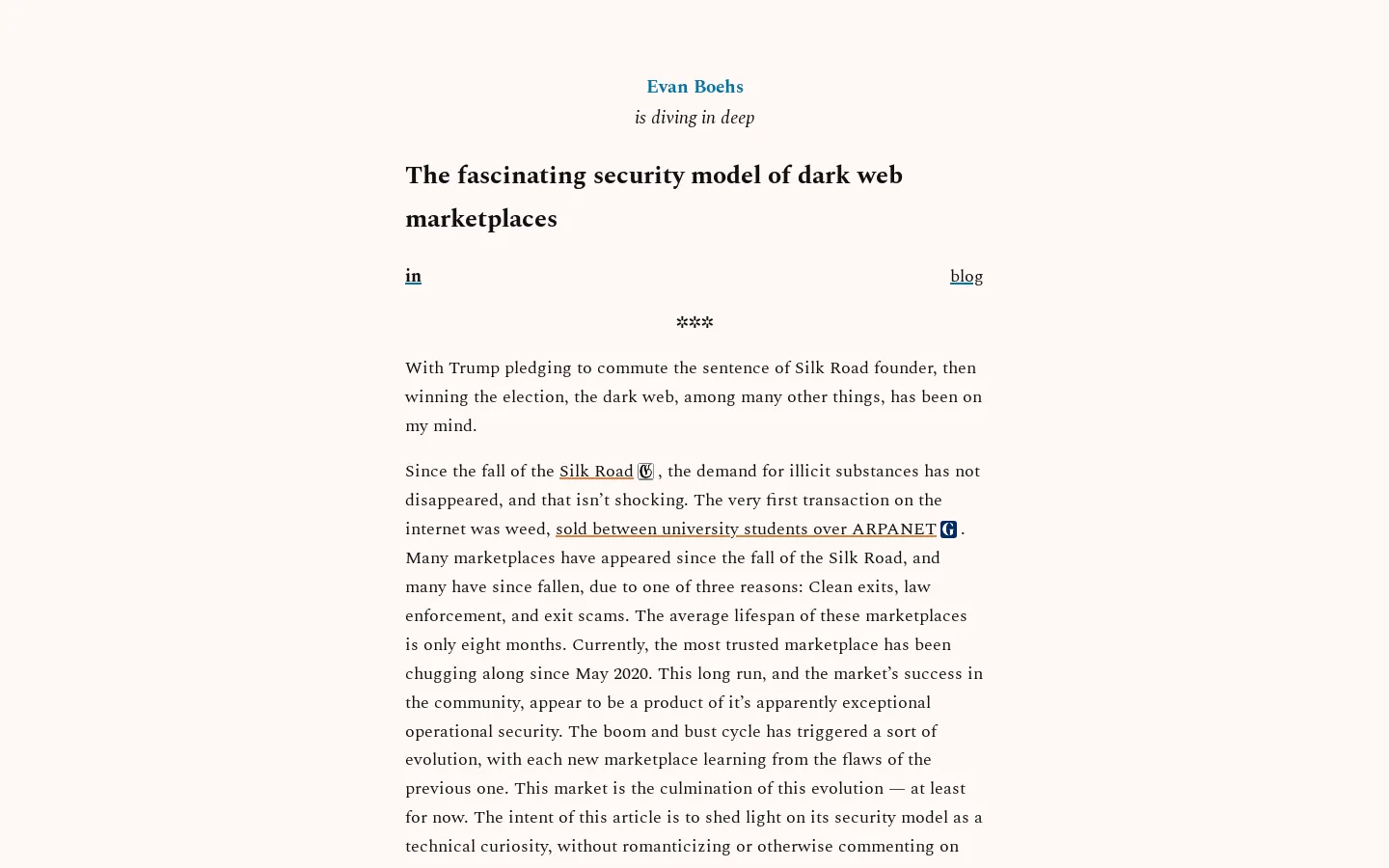
Security Models of Dark Web Marketplaces Analyzed
/ 4 min read
Quick take - Recent analyses of dark web marketplaces reveal a persistent demand for illicit substances and highlight the innovative security measures these platforms employ to enhance user safety and anonymity in response to law enforcement scrutiny and past failures.
Fast Facts
-
Evolution of Marketplaces: Dark web marketplaces have adapted and evolved since the Silk Road’s closure, maintaining a strong demand for illicit substances and addressing vulnerabilities from past failures.
-
Enhanced Security Measures: Current marketplaces employ innovative operational security techniques, including anti-phishing strategies like captchas and PGP for user verification, to protect user identities and transactions.
-
Cryptocurrency Preference: Monero is favored over Bitcoin for transactions due to its superior anonymity features, influencing the security landscape of dark web marketplaces.
-
Ongoing Law Enforcement Challenges: Despite increased scrutiny from law enforcement, dark web marketplaces continue to thrive, likely implementing more advanced security measures in the future.
-
User Awareness and Best Practices: Users are encouraged to prioritize operational security, utilize strong authentication methods, and be cautious with URLs to navigate dark web marketplaces safely.
Analyzing the Evolution and Security of Dark Web Marketplaces
In the shadowy realm of the internet known as the dark web, a recent analysis has illuminated the persistent demand for illicit substances and the innovative tactics employed by contemporary marketplaces to enhance user safety and anonymity. This investigation not only underscores ongoing activity in these clandestine spaces but also highlights sophisticated security measures developed in response to law enforcement efforts and past marketplace failures.
Evolution of Dark Web Marketplaces
The closure of Silk Road, a notorious dark web marketplace, marked a significant turning point in the evolution of these platforms. Despite its shutdown, the demand for illicit substances has remained robust, prompting the emergence of new platforms. These marketplaces have adapted and evolved their structures to address challenges and vulnerabilities exposed by past failures. The resilience of these platforms is evident in their ability to continuously attract users while evading law enforcement scrutiny.
Operational Security Measures
A critical examination of operational security models used by leading dark web marketplaces reveals a range of innovative techniques designed to enhance user safety. These measures are crucial for protecting users from both external threats and internal vulnerabilities. By implementing advanced encryption protocols and secure communication channels, these platforms ensure that transactions occur with a heightened sense of security. This focus on operational security is essential for maintaining user trust in an environment fraught with risks.
Anti-Phishing Strategies
The investigation delves into unique anti-phishing tactics employed by these marketplaces, particularly their use of captchas and Pretty Good Privacy (PGP) for user verification. Notably, this system operates without relying on JavaScript, which often presents security risks. This approach not only helps safeguard user identities but also bolsters trust in the marketplace environment. By prioritizing anti-phishing measures, these platforms protect users from fraudulent schemes designed to compromise their credentials or financial information.
Cryptocurrency Usage
Further analysis focuses on the choice of cryptocurrency for transactions, specifically the preference for Monero over Bitcoin. Monero offers enhanced anonymity features that appeal to users seeking to protect their identities in an environment fraught with risks. Unlike Bitcoin, where transactions are recorded on a public ledger, Monero obfuscates sender, receiver, and transaction amounts. This decision influences the overall security landscape of the marketplace and reflects a broader trend towards privacy-centric digital currencies.
Implications and Future Considerations
The findings of this analysis point to a sophisticated and adaptive dark web ecosystem that continues to thrive despite increasing law enforcement scrutiny. As marketplaces evolve, they are likely to implement even more advanced security measures and anonymity techniques, complicating efforts to regulate or dismantle these networks. Furthermore, the preference for cryptocurrencies like Monero may prompt ongoing discussions about privacy, legality, and the future of digital currencies in illicit activities.
Actionable Steps for Users
For those navigating or discussing topics related to dark web marketplaces and their security models, several best practices can enhance understanding and efficiency:
-
Prioritize Operational Security (OpSec): Be aware of potential risks and implement measures to protect your identity and sensitive information.
-
Utilize Strong Authentication Methods: Enable two-factor authentication (2FA) whenever possible to add an extra layer of security to your accounts.
-
Be Cautious with URLs and Mirrors: Always double-check URLs to ensure they are legitimate, as many fraudulent sites may appear similar to reputable ones.
By adhering to these practices, users can improve their security posture and navigate the complex environment of dark web marketplaces with greater confidence and safety.



